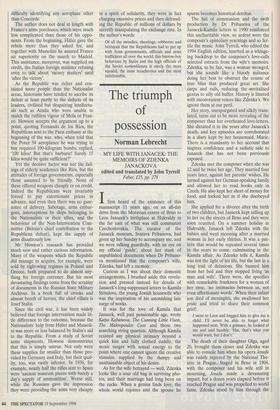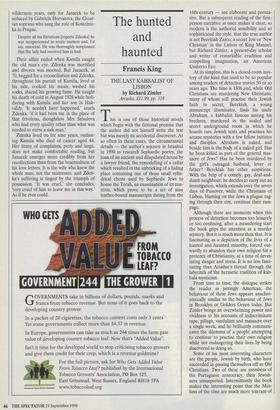The triumph of possession
Norman Lebrecht
MY LIFE WITH JANACEK: THE MEMOIRS OF ZDENKA JANACKOVA edited and translated by John Tyrrell Faber, £25, pp. 278 Ifirst heard of the existence of this manuscript 11 years ago, on an all-day drive from the Moravian centre of Brno to Leos Janacek's birthplace at Hukvaldy in the far east of what was still communist Czechoslovakia. The curator of the Janacek museum, Svatava Pribanova, had given up her Sunday to accompany me, and we were talking guardedly, with an eye on my official 'guide', about her stash of unpublished documents when Dr Pribano- va mentioned that the composer's wife, Zdenka, had left a memoir.
Curious as I was about their domestic arrangements, I brushed aside this revela- tion and pressed instead for details of Janacek's long-suppressed letters to Kamila Stosslova, the young Jewish housewife who was the inspiration of his astonishing late surge of works.
It was for the love of Kamila that Janacek, well past pensionable age, wrote Katya Kabanova, The Cunning Little Vixen, The Makropoulos Case and those two searching string quartets. Although Kamila resisted any physical intimacy beyond a quick kiss and fully clothed cuddle, the music surges with sexual energy to the point where one cannot ignore the creative stimulus supplied by the dumpy and unattainable object of his desire.
As for the wife betrayed = well, Zdenka looks like a sour old bag in surviving pho- tos, and their marriage had long been on the rocks. When a genius finds love, the whole world rejoices and the spouse he spurns becomes historical detritus.
The fall of communism and the swift production by Dr Pribanova of the Janacek-Kamila letters in 1990 reinforced this uncharitable view, so ardent were the composer's epistolary yearnings and so fer- tile the music. John Tyrrell, who edited the 1994 English edition, inserted as a whinge- ing backdrop to the composer's love-calls selected extracts from the wife's memoirs. Zdenka, to be fair, was a woman wronged, but she sounds like a bloody nuisance doing her best to obstruct the course of true bliss that produced great art. She carps and rails, reducing the .revitalised genius to silly old buffer. History is littered with inconvenient voices like Zdenka's. We ignore them at our peril.
Her story, unexpurgated and silkily trans- lated, turns out to be more revealing of the composer than her overheated love-letters. She dictated it in the years after Janacek's death, and key episodes are corroborated in a diary kept by her housemaid, Marie. There is a mundanity to her account that inspires confidence and a sadistic side to Janacek that has not been previously exposed.
Zdenka met the composer when she was 12 and he twice her age. They married four years later, against her parents' wishes. He turned against her German-speaking family and allowed her to read books only in Czech. He also kept her short of money for food, and locked her in if she disobeyed him.
She applied for a divorce after the birth of two children, but Janacek kept sidling up to her on the streets of Brno and they were soon reunited. On a summer holiday in Hukvaldy, Janacek left Zdenka with the babies and went mooning after a married woman in her early thirties. It was a pat- tern that would be repeated several times in the years to come, culminating in the Kamila affair. As Zdenka tells it, Kamila was not the light of his life, but the last in a long trail of delusions. She banned him from her bed and they stopped living 'as man and wife'. There were, she specifies with remarkable frankness for a woman of her time, `no intimacies between us, not even affectionate words'. When their infant son died of meningitis, she swallowed her pride and tried to share their common grief:
I went to Leos and begged him to give me a child. I'll never be able to forget what happened next. With a grimace, he looked at me and said harshly: `11m, that's what you would want, but I don't.'
The death of their daughter Olga, aged 20, brought them closer and Zdenka was able to console him when his opera Jenufa was rudely rejected by the National The- atre in Prague: Staged in Brno in 1904, with the composer and his wife still in mourning, Jenufa made a devastating impact, but a dozen years elapsed before it reached Prague and was propelled to world fame. Zdenka stood by him through the wilderness years, only for Janacek to be seduced by Gabriela Horvatova, the Croat- ian soprano who sang the role of Kostelnic- ka in Prague.
Despite all his flirtations [reports Zdenka] he was inexperienced in erotic matters and, I'd say, innocent. He was thoroughly nonplussed that the lady had received him in bed.
Their affair ended when Kamila caught the old man's eye. Zdenka was mortified and divorce was mooted. But Janacek, at 70, begged for a reconciliation and Zdenka, throughout his pursuit of Kamila, lived at his side, cooked his meals, washed his socks, shared his growing fame. He caught his death of cold in August 1928 while holi- daying with Kamila and her son in Huk- valdy. 'It needn't have happened,' snarls Zdenka, 'if it had been me in the place of that frivolous, thoughtless Mrs StOsslova who had every quality other than what was needed to nurse a sick man.'
Zdenka lived on for nine years, outlast- ing Kamila who died of cancer aged 44. Her litany of complaints, petty and large, does not make comfortable reading, but Janacek emerges more credibly from her recollections than from the besottedness of his love letters. It is the wife who knew the whole man, not the mistresses, and Zden- ka's suffering is tinged by the triumph of possession. 'It was cruel,' she concludes, `very cruel of him to leave me in this way.' As if he ever could.











































































 Previous page
Previous page